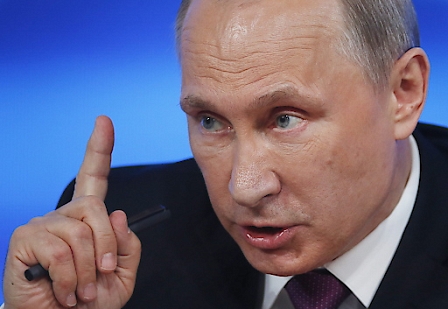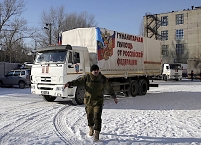Erstellt am: 12. 1. 2015 - 16:17 Uhr
Be careful what you wish for!
Terrorism is at the fore today, both in Europe and in Nigeria. Millions of people took to the streets of Europe in Unity marches, while in Nigeria, a wave of attacks by Boku Haram has left thousands dead.
Against this drama, the ongoing situation in Ukraine has rather slipped into the shadows, but they are still going on. Presidents Putin and Poroshenko have been meeting with Chancellor Merkel and others over the weekend, and today all the foreign ministers are getting together in Berlin.
However, despite months and months of talks, bust-ups, talks about talks, and yet more talks, nothing much seems to be changing. Ukraine is in a stalemate, and the only figure who could possibly get things moving is President Putin, and he's not budging.

EPA/SERGEI CHIRIKOV
Putin's response to pressure
It's not really surprising. Vladimir Putin doesn't look like the sort of man who bows down to pressure, and his record to date shows the opposite is more the case. The more pressure put on him from abroad, the harder he digs in.
Therefore, it's hard to see what sanctions can achieve - but in the words of analyst, Gerhard Mangott, "The options are very limited: do nothing, go to war, or adopt economic sanctions". The first option is not politically viable, the second is undesirable and unrealistic, and the the third, well, be careful what you wish for!

EPA/ALEXANDER ERMOCHENKO
What should sanctions achieve?
While sanctions may have a "feel good" factor for the west, they are not without risks. Some western powers support sanctions in the hope that Mr Putin will change his behaviour.
Well, that's a non-starter: backing down is not in Mr Putin's vocabulary, and Moscow shows no sign of withdrawing support for pro-Russian separatists in eastern Ukraine.
Others support sanctions in the hope that economic pressure will cause Russians to question Putin's legitimacy as a leader, and ultimately force him from office. In the short term, that won't happen. Mr Putin enjoys over 80% popular support - a figure western leaders can only dream about. Longer term, if the economy were to fail completely, yes, the people could turn on him - but the big question is, what then? A post-Putin Russia would not necessarily go in the direction western leaders would like.
Just keep talking....
Unseating foreign leaders, by any methods or means, rarely ends well. So, sanctions that pinch but don't quite hurt are probably the best bet - and keep on talking. Russia's economy isn't just struggling because of the sanctions, there are many other factors as well, including the low price of oil. Keep talking, and maybe they can talk until the price of oil recovers and the world goes into economic boom again.
Analyst, Gerhard Mangott, considers whether economic pressure from the west can force Putin to change his stance on Ukraine.
Dieses Element ist nicht mehr verfügbar
Also on Reality Check:

APA/HERBERT NEUBAUER
Vienna unity rally
Chris Cummins reports on last night's Unity Rally at the Vienna Ballhausplatz in the wake of the Charlie Hebdo attacks.
Dieses Element ist nicht mehr verfügbar
The terror debate
Political scientist, Farid Hafez, from Salzburg University discusses the broader questions arising from the Charlie Hebdo attacks.

EPA/STR
Dieses Element ist nicht mehr verfügbar
Nigeria suffers wave of Boku Haram attacks
A suicide bomb on a 10 year old girl is the latest in a series of horrific attacks attributed to Boku Haram in Nigeria. Lizzy Donnelly of Chatham House discusses the wave of attacks which has killed hundreds of people in the last week.
Dieses Element ist nicht mehr verfügbar
FM4 Reality Check
Monday to Friday from 12.00 to 14.00, and after the show via Podcast or fm4.orf.at/realitycheck.


